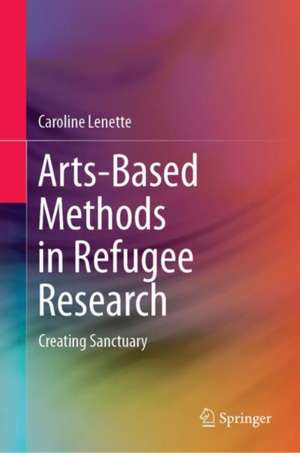Arts-Based Methods in Refugee Research: Creating Sanctuary
Autor Caroline Lenetteen Limba Engleză Hardback – 14 mai 2019
The book tackles questions of meaningful research practice: How do people with lived experiences of forced migration—Knowledge Holders—lead the way? Can arts-based methods bring about policy and social change? And what of ethical issues?
By reflecting on the strengths and limitations of four research methods (digital storytelling, photography, community music, and participatory video), readers are invited to craft their own approach to arts-based projects.
Preț: 496.79 lei
Preț vechi: 620.98 lei
-20% Nou
Puncte Express: 745
Preț estimativ în valută:
95.06€ • 99.06$ • 78.71£
95.06€ • 99.06$ • 78.71£
Carte tipărită la comandă
Livrare economică 31 martie-05 aprilie
Preluare comenzi: 021 569.72.76
Specificații
ISBN-13: 9789811380075
ISBN-10: 9811380074
Pagini: 233
Ilustrații: XXV, 240 p. 38 illus., 25 illus. in color.
Dimensiuni: 155 x 235 x 21 mm
Greutate: 0.67 kg
Ediția:1st ed. 2019
Editura: Springer Nature Singapore
Colecția Springer
Locul publicării:Singapore, Singapore
ISBN-10: 9811380074
Pagini: 233
Ilustrații: XXV, 240 p. 38 illus., 25 illus. in color.
Dimensiuni: 155 x 235 x 21 mm
Greutate: 0.67 kg
Ediția:1st ed. 2019
Editura: Springer Nature Singapore
Colecția Springer
Locul publicării:Singapore, Singapore
Cuprins
Part I: Context.- Social Context. Why Arts-based Research?.- Policy Change.- Ethics.- Part II: Methods.- Digital Storytelling.- Photography.- Community Music.- Participatory Video.
Notă biografică
Caroline Lenette is Senior Lecturer in the School of Social Sciences, University of New South Wales, Sydney, Australia. She is a member of the UNSW Forced Migration Research Network, an interdisciplinary network of leading researchers in refugee and migration studies. Over the past ten years, Caroline has used arts-based methods in social-justice focused research to collaborate with co-researchers with lived experiences as refugees and asylum seekers, especially women. Together, they explored stories of wellbeing, cultural identity, and settlement through arts-based methodologies. She has published widely on these topics. Caroline’s research interests include understanding how creative outcomes can influence decision-makers towards meaningful social change, and the ethical considerations of collaborative, arts-based research and participatory research more broadly.
Textul de pe ultima copertă
Drawn from a decade of refugee studies, this book offers a wealth of insights on arts-based methodologies. It explores exciting new prospects for participatory and culturally safe research, and will be a reference resource for researchers of all levels and community practitioners.
The book tackles questions of meaningful research practice: How do people with lived experiences of forced migration—Knowledge Holders—lead the way? Can arts-based methods bring about policy and social change? And what of ethical issues?
By reflecting on the strengths and limitations of four research methods (digital storytelling, photography, community music, and participatory video), readers are invited to craft their own approach to arts-based projects.
The book tackles questions of meaningful research practice: How do people with lived experiences of forced migration—Knowledge Holders—lead the way? Can arts-based methods bring about policy and social change? And what of ethical issues?
By reflecting on the strengths and limitations of four research methods (digital storytelling, photography, community music, and participatory video), readers are invited to craft their own approach to arts-based projects.
Caracteristici
Includes case studies to illustrate the potential of arts-based methods in refugee research Addresses the capacity for arts-based methods in research to influence policy development and implementation Includes a quick reference guide to key research in participatory arts-based methods with refugees
